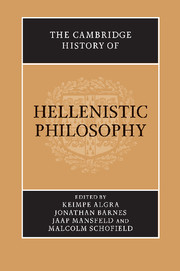Book contents
- Frontmatter
- PART I INTRODUCTION
- PART II LOGIC AND LANGUAGE
- PART III EPISTEMOLOGY
- 7 Introduction: the beginnings of Hellenistic epistemology
- 8 Epicurean epistemology
- 9 Stoic epistemology
- 10 Academic epistemology
- PART IV PHYSICS AND METAPHYSICS
- PART V ETHICS AND POLITICS
- Synopsis of principal events
- Editions of sources and fragments
- List of abbreviations
- Bibliography
- Index locorum
- General Index
- References
9 - Stoic epistemology
from PART III - EPISTEMOLOGY
Published online by Cambridge University Press: 28 March 2008
- Frontmatter
- PART I INTRODUCTION
- PART II LOGIC AND LANGUAGE
- PART III EPISTEMOLOGY
- 7 Introduction: the beginnings of Hellenistic epistemology
- 8 Epicurean epistemology
- 9 Stoic epistemology
- 10 Academic epistemology
- PART IV PHYSICS AND METAPHYSICS
- PART V ETHICS AND POLITICS
- Synopsis of principal events
- Editions of sources and fragments
- List of abbreviations
- Bibliography
- Index locorum
- General Index
- References
Summary
The possibility of knowledge
Stoic epistemology is best understood as a response to a twofold challenge. Socrates had assumed that whether one had a good life depended on whether one had managed to acquire a certain kind of knowledge, which he identified with wisdom, in particular the knowledge of what is good and what is bad. For this reason he had devoted his life to philosophical inquiry concerning the good, the bad and related matters. Yet, for all of his efforts, even he himself did not think that he had obtained this knowledge. At the same time Socrates had made it clear that we should not content ourselves with mere belief or opinion concerning these matters, even if this belief happened to be true. One would not want to rely for the success or failure of one's life on mere opinion which at best happened to be true. Moreover, the Socratic elenchus suggested that one was not entitled to any belief which one did not hold as a matter of knowledge. For Socratic refutation seemed to rest on the fact that somebody who holds a belief as a matter of mere opinion can be made to see that he has equal reason to espouse the contradictory belief.
A century of philosophers since Socrates had done no better. Indeed, as if oblivious to Socrates’ strictures against mere belief, they had rushed precipitously to produce thesis after thesis, theses often quite extravagant and often contradicting each other, and in any case all a matter of mere opinion, as closer scrutiny would reveal.
- Type
- Chapter
- Information
- The Cambridge History of Hellenistic Philosophy , pp. 295 - 322Publisher: Cambridge University PressPrint publication year: 1999
References
- 29
- Cited by



